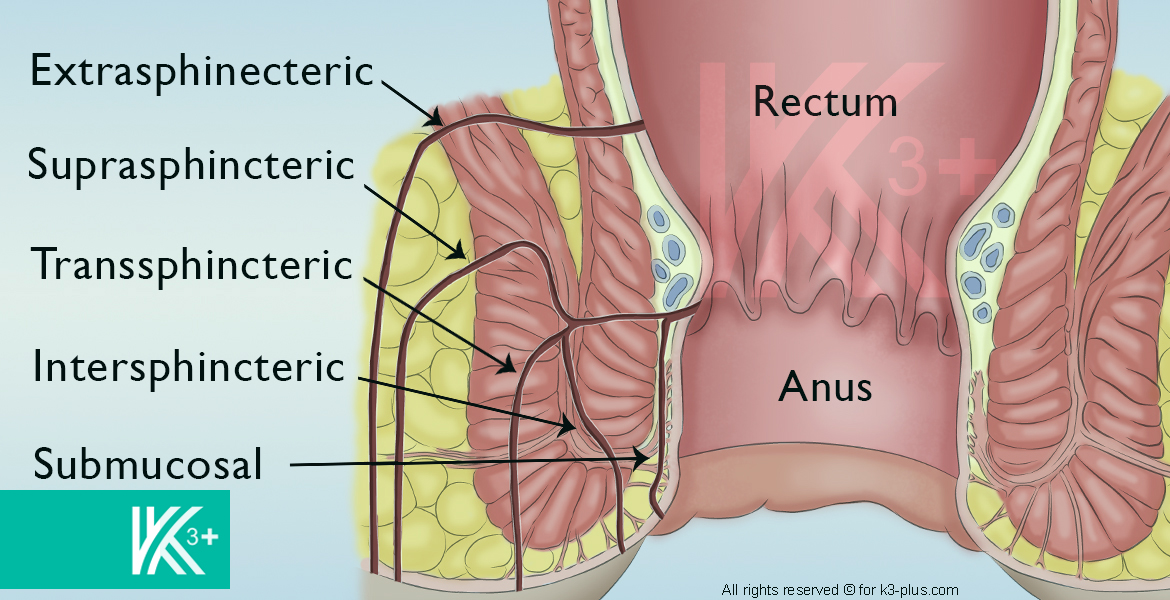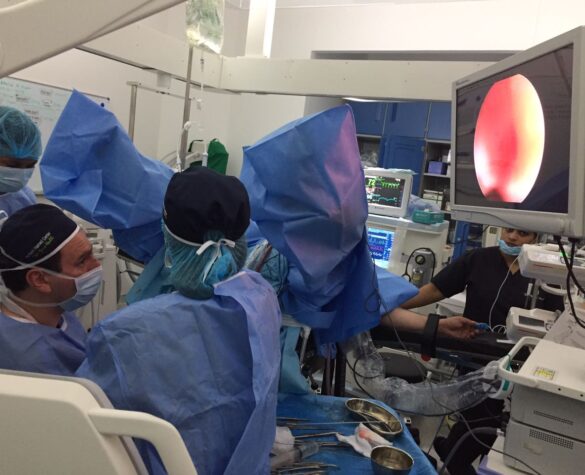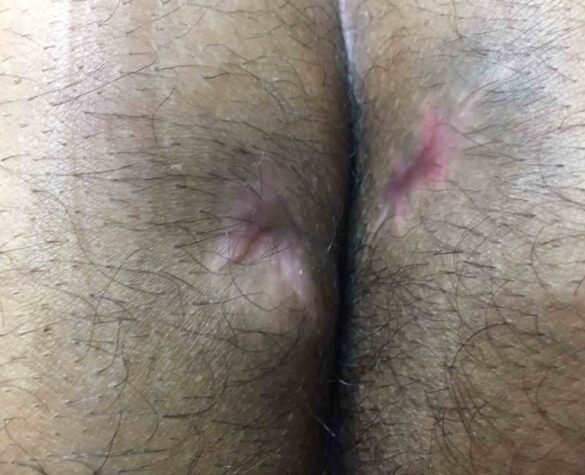ANAL FISTULA



What is an anal fistula?
Fistulas / fistula is an abnormal connection between the surface of the anal canal covered in epithelial tissue and the skin, usually in the perianal region.
A fistula can also be defined as an ulcer (opening in the body tissue) in the form of a narrow tube that extends in the body around the anus.
How does it arise?
To explain the origin of the fistulas, some explanation is necessary about the anal glands, as the anal glands are located between the anal sphincters (two muscles around the anus) and each gland pours its materials through an outlet to the anal canal, but if this port is blocked, it results in the formation of an abscess that extends to the surface of the skin, forming a channel that represents the fistula .
Fistula obstruction
The fistula can branch in several directions and if it is blocked, this can result in the formation of a number of abscesses, which allows the pus to accumulate and to go out to the surface of the skin in several areas.
Fistulas obstruction also causes severe pain. Whenever the opening of the fistula is closed, the fistula turns into an abscess, and it causes severe pain to the patient.
Fistula without an abscess
The fistula may occur without an abscess, so the fistula in this case does not cause any pain, but only secretions.
Causes
- Next, the direct causes that cause fistulas, knowing that the cause of fistula is unknown in many cases, but the most important causes of anal fistula are.
- An anal abscess burst, so the anal fistulas forms as a result of mixing of materials for an anal abscess that has burst.
- As a result of surgery, a fistulas may occur after incomplete surgeries to drain an abscess.
Fistula is linked to intestinal inflammation. Anal fistulas are also associated with some conditions that lead to inflammation in the intestine, including irritable bowel syndrome, diverticulitis, ulcerative colitis, Crown disease, tuberculosis, gonorrhea, and rarely, rectal cancer.
Symptoms
Fistula can present with several symptoms related to the anus, and thus the main symptoms of anal fistula
- The pain
- Purulent or bloody secretions
- Anal itching
Diagnosis
Fistula is diagnosed by examination in clinics, and during the examination, some of the following results may appear:
- Watch for a fistula swelling on the skin near the anus
- The patient feels severe pain if he really has a fistula.
- Watch the redness
- Touching the doctor with his hand helps him to determine if there is an area of hardening or excessive thickness indicating the presence of chronic inflammation
- Watch for any discharge / discharge
Other tests help diagnose a fistula accurately
To determine the course of the fistula and make sure that there are branches, and the existence of branches and length of the fistula, and to make sure that there are no other pathological problems that are the reason behind the appearance of the fistula, the following examinations can be carried out according to the opinion of the doctor.
- EAUS intra-anal ultrasound (this examination is done with devices available in Dr. Khaldoon Al Gharib Clinics).
- Magnetic resonance. It is also available (this examination is done with devices available at Dr. Khaldoon Al Gharib Clinics).
Fistula treatment
Fistula treatment without surgery
Laser and endoscopic fistula treatment, VAAFT, FELC & ViLAC
The VAAFT technique is the latest technology in treating perianal fistulas in the world. The use of this technique eliminates the need to perform any wound, even an incision, in the body.
Through the “ VAAFT” device, a very thin endoscope is used, and inside the endoscope a laser is inserted to treat the fistula in its place inside and after completion, natural collagen is injected.
“The best technique for treating fistula is “Endoscopy VAAFT” Because it maintains the integrity of the anal muscles” … dr. Khaldoun Ghareb
- Fistula treatment with VAAFT technology is a very easy treatment that takes place in the hospital under regional or general anesthesia. anesthesia and does not require more than five minutes for a simple fistula. With very mild pain. The patient can leave the hospital in few days and resume his normal life in few days.
Features of fistula treatment laparoscopic and laser
- Not injured
- no pain
- None of the muscles of the anus are harmed, so there is no possibility of constipation or faecal gases
- No bandages as there is no wound at all.
- The patient can go home few hours after the procedure, where there is no pain, and his daily activities can be continued in a very few days.
Surgical methods of treating fistula
Open fistula pathway Fistulotomy
This surgery is based on opening the fistula channel completely, where the surgeon makes a cut in the opening of the fistula channel from one end to reaching the other end (from the inner orifice to the outer opening), thus the fistula channel is completely opened, then the dead and contaminated tissues are removed from the channel.
The process of opening the fistula pathway includes the implementation of a small cut in the anal flexing muscles according to the degree and branch of the fistula, and some degrees of the fistula and its position may require the use of this process in stages, especially if there is an insertion of the fistula inside the voluntary anal muscles in order to deal with it gradually while maintaining the efficiency The muscles are fully worked out.
Seton technology
The Seton technique for treating a fistula is based on the principle of using a thread inside the fistula from the beginning to the end and then extending this thread to tie the two ends of the thread so that one end comes out from the anus and the other end from the opening of the fistula
These strings are left hanging from the anus for a while until it drains the secretions from the inside to the outside, thus emptying the fistula from the secretions, which is what it adopts. Seton method
The two methods, the Seton technique and the Fistulotomy method, have the potential for some degree of constipation.
Advancement rectal flap
This technique uses a patch of the rectal wall to close the fistula’s internal opening. To reduce the recurrence rate.
“Success rates vary according to the situation and technology But it’s not 100%” … dr. Khaldoun Ghareb
Risks of not treating a fistula
Ignore fistula symptoms
Embarrassment and shame
A number of patients ignore the symptoms of a fistula, although its symptoms are clear. Some patients decide to ignore the matter mainly because of embarrassment about the subject, or embarrassment to see a doctor and reveal the area where the fistula got .
Don’t care!
The patient must realize that the doctor is the only one entrusted with these health problems, the doctor is committed to the ethics, laws and division of the medical profession, and the doctor deals with the case professionally with the aim of treating the disease from its roots with respect and without any prejudice to the patient’s dignity and respect.
Be patient with the pain and not attempt to diagnose it … dr. Khaldoun Ghareb
Unfortunately, this happens to many, which delays the discovery and treatment of the fistula, so the patient is forced to see a doctor after the condition has become advanced and complicated. It is necessary to visit a specialist doctor to diagnose the fistula and thus treat it, which is simple.
Ignore treating the fistula, despite its diagnosis
Ignoring the treatment of the fistula even if it is small in size leads to an increase in the widening of the fistula channel and thus destroying a number of tissues in the surrounding anal area, and this may affect the patient’s ability to control the defecation process and control the release of gases. Also, ignoring the fistula may result in toxic infection that spreads to the rest of the body
“Finally , any roads are the best, my advice is to deal with fistula laser VILAC and telescope VAAFT together” … dr. Khaldoun Ghareb
Fistula Surgery Failure & Success rate
There is no 100% success rate in Fistula Surgery, You should Know the following before Perform Fistula Surgery?
- The applied technique
- Relapses/Complications
- Success rate
Video explaining the no 100% success rate in Fistula Surgery
What is the solution if the fistula returns?
Then the solution if the fistula returns is to repeat the surgery using the same/other technique, Reasons that may lead to the return of the fistula:
- Not choosing the right technique
- Unskilled in using the applied technique
Diseases that may cause a recurrence of the fistula:
- Crohn’s disease
- Ulcerative colitis
- Constipation
- Diarrhea
- Others
If you have any symptoms that appear from time to time please make sure to follow Dr. Khaldoun on Tiktok, Youtube, Facebook, Instagram & Linkedin
FAQs about Fistulas
I have what looks like a pill in my lower back. This pill has a hole through which secretions come out only when I press it hard to squeeze it, is this a fistula?
Can the type of pain indicative of a fistula be distinguished from other pain?
I have a hole in my body, but in a different place than the picture here, where the hole is in the area under the anus, but I do not suffer any pain just a smell that I recently started to smell from it.
I visited a doctor and he told me that I have a fistula, but I do not suffer from pain, secretions, or itching, and I am not convinced of the diagnosis, should I ignore it?
Do you have Symptoms?
Do you suffer from any of the symptoms of anal disease:
- blood
- Itch
- swelling
- pain
- bad smell
There are patients suffer these symptoms for years, even though it could treated within half an hour. Consult Proctologist Now from this link




